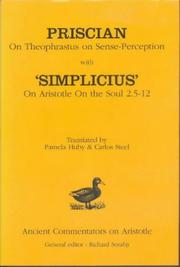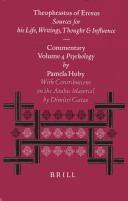| Listing 1 - 10 of 30 | << page >> |
Sort by
|
Book
Year: 1954 Publisher: Louvain: Publications universitaires de Louvain,
Abstract | Keywords | Export | Availability | Bookmark
 Loading...
Loading...Choose an application
- Reference Manager
- EndNote
- RefWorks (Direct export to RefWorks)
Book
ISBN: 9789042931305 9782758402145 9042931302 2758402149 Year: 2015 Volume: *4 Publisher: Louvain-la-Neuve Peeters
Abstract | Keywords | Export | Availability | Bookmark
 Loading...
Loading...Choose an application
- Reference Manager
- EndNote
- RefWorks (Direct export to RefWorks)
Metaphysics --- Theophrastus of Eresus --- Theophrastus. --- Théophraste, --- Theophrastus --- Théophraste --- Théophraste

ISBN: 3515017852 9783515017855 Year: 1974 Volume: 8 Publisher: Wiesbaden, : F. Steiner,
Abstract | Keywords | Export | Availability | Bookmark
 Loading...
Loading...Choose an application
- Reference Manager
- EndNote
- RefWorks (Direct export to RefWorks)
Theophrastus --- Manuscripts --- Criticism, Textual --- Manuscripts. --- Criticism, Textual. --- Theophrastus - Manuscripts --- Theophrastus - Criticism, Textual

ISBN: 0887380093 9780887380099 Year: 1985 Volume: v. 2 Publisher: New Brunswick, NJ : Transaction Publishers, Rutgers University,
Abstract | Keywords | Export | Availability | Bookmark
 Loading...
Loading...Choose an application
- Reference Manager
- EndNote
- RefWorks (Direct export to RefWorks)
Theophrastus --- Criticism and interpretation --- -Feofrast --- Theophrast --- Théophraste --- Theophrastos --- Teofrasto --- Theophrastus, --- Θεόφραστος --- -Criticism and interpretation --- -Theophrastus --- Théophraste --- Criticism and interpretation. --- Feofrast
Book
ISBN: 0405140533 9780405140532 Year: 1981 Publisher: New York (N.Y.): Arno Press
Abstract | Keywords | Export | Availability | Bookmark
 Loading...
Loading...Choose an application
- Reference Manager
- EndNote
- RefWorks (Direct export to RefWorks)
Theophrastus --- Feofrast --- Theophrast --- Théophraste --- Theophrastos --- Teofrasto --- Theophrastus, --- Θεόφραστος --- Théophraste --- Law, Greek --- Greek law --- Law, Ancient --- Theophrastus. --- Law, Greek - Sources


ISBN: 9781472558473 1472558472 9780715627525 071562752X Year: 1997 Publisher: London Duckworth
Abstract | Keywords | Export | Availability | Bookmark
 Loading...
Loading...Choose an application
- Reference Manager
- EndNote
- RefWorks (Direct export to RefWorks)
Simplicius and Priscian were two of the seven Neoplatonists who left Athens when the Christian Emperor Justinian closed the paganschool there in A.D. 529. The commentaries ascribed to them on works on sense-perception, one by Aristotle and one by his successor Theophrastus, are translated here in this single volume. Both commentaries give a highly Neoplatonic reading to their Aristotelian subjects and tell us much about late Neoplatonist psychology. This volume is also designed to enable readers to assess a recent major controversy: it has been argued by Carlos Steel and Fernand Bossier that the commentary ascribed to Simplicius is in fact by Priscian, and their article, hitherto only available in Dutch, is here published in revised form and in English for the first time. This book therefore contains all the evidence necessary for readers to judge this intriguing question for themselves.
Neoplatonism. --- Theophrastus. --- Aristotle. --- Simplicius, --- Priscian, --- De anima (Aristotle) --- De sensibus (Theophrastus) --- Academic collection --- Neoplatonism --- Perception (Philosophy) --- Senses and sensation --- Soul --- Aristoteles, --- Theophrastus --- Aristoteles, - 0384-0322 av. J.-C.
Book
ISSN: 00791687 ISBN: 9789004268821 9004268820 1306689007 9004268766 9789004268760 Year: 2014 Volume: 136 Publisher: Leiden Brill
Abstract | Keywords | Export | Availability | Bookmark
 Loading...
Loading...Choose an application
- Reference Manager
- EndNote
- RefWorks (Direct export to RefWorks)
This volume concerns Theophrastus, Aristotle's pupil and successor as head of the Peripatetic School. The focus is twofold. First, it deals with discoveries and inventions, both useful and pleasurable, and more generally changes that transformed the way people live. Theophrastus wrote a work entitled On Discoveries , which may be regarded as cultural history. Second, the volume focuses on proverbs: familiar sayings containing useful truths that have been observed by earlier generations and passed on in a form that is concise and attractive. Theophrastus wrote a work entitled On Proverbs and made use of proverbs in his writings on ethics, rhetoric and humor. He recognized their importance in educating the young and maintaining the traditions of an earlier age.
Peripatetics --- Proverbs in literature --- Theophrastus --- Peripatetics. --- Proverbs in literature. --- Philosophy, Ancient --- Theophrastus. --- Feofrast --- Theophrast --- Théophraste --- Theophrastos --- Teofrasto --- Theophrastus, --- Θεόφραστος

ISSN: 00791687 ISBN: 9004094385 9004094407 9004094393 9004326065 9789004094390 9789004094383 9789004094406 Year: 1992 Volume: 54 Publisher: Leiden: Brill,
Abstract | Keywords | Export | Availability | Bookmark
 Loading...
Loading...Choose an application
- Reference Manager
- EndNote
- RefWorks (Direct export to RefWorks)
These two volumes represent the first fruits of an international project to produce a new collection - text, translation and commentary - of the fragments and testimonia relating to Theophrastus (c. 370-288/5 B.C.), Aristotle's pupil and successor as head of the Lyceum. The need for a new collection was apparent: the standard collection, by Wimmer, is already 120 years old, whereas we now have far better texts of many of the ancient authors in which fragments and testimonia of Theophrastus occur. Whilst classicists have devoted the past hundred years to bringing into the light the work of the major post-Aristotelian schools, the contribution of Theophrastus has remained obscure. The second printing contains corrections to the first. This first stage of the project presents the texts, critical apparatus and English translation of the fragments and testimonia. It contains a long methodological introduction, an index of Theophrastean texts and concordances with other collections (Scheider, Wimmer and the several recent partial editions). The second stage of the project, which Brill will also publish will consist of 9 commentary volumes, planned at present as follows: 1. Life, Writings, various reports (M. Sollenberger, Mt. St. Mary's College) 2. Logic (P.M. Huby, Liverpool University) 3. Physics (R.W. Sharples, University College London) 4. Metaphysics, Theology, Mathematics, Psychology (P.M. Huby, Liverpool University) 5. Human Physiology, Living Creatures, Botany (R.W. Sharples, University of London) 6. Ethics, Religion (W.W. Fortenbaugh, Rutgers University) 7. Politics (J. Mirhady) 8. Rhetoric, Poetics (W.W. Fortenbaugh, Rutgers University) 9. Music, Miscellaneous Items and Index of proper names, subject index, selective index of Greek, Latin and Arabic terms (several authors/editors). Most of the nine commentary volumes will include significant discussion of Arabic texts, with contributions by Dimitri Gutas (Yale University) and Hans Daiber (Free University of Amsterdam). It is expected that the first commentary volume, volume 5, will appear in the course of 1993.
Authors, Greek --- Philosophers --- Ecrivains grecs --- Philosophes --- Biography --- Sources. --- Biographie --- Sources --- Biographies --- Theophrastus. --- Philosophes grecs --- SourcesBiographies --- Théophraste, --- Greek authors --- Scholars --- Biography&delete& --- Theophrastus --- Théophraste --- Authors [Greek ] --- Greece --- SourcesBiographies. --- Feofrast --- Theophrast --- Théophraste --- Theophrastos --- Teofrasto --- Theophrastus, --- Θεόφραστος
Book
ISBN: 0887381715 9780887381713 Year: 1988 Volume: 3 Publisher: New Brunswick Transaction
Abstract | Keywords | Export | Availability | Bookmark
 Loading...
Loading...Choose an application
- Reference Manager
- EndNote
- RefWorks (Direct export to RefWorks)
Peripatetics --- Congresses. --- -Philosophy, Ancient --- Congresses --- Theophrastus --- -Feofrast --- Theophrast --- Théophraste --- Theophrastos --- Teofrasto --- Theophrastus, --- Θεόφραστος --- Criticism and interpretation --- -Congresses --- -Criticism and interpretation --- -Theophrastus --- Théophraste --- Philosophy, Ancient --- Feofrast --- Peripatetics - Congresses.
Book
ISSN: 00791687 ISBN: 9004362282 9789004362284 9789004362277 9004362274 Year: 2018 Volume: 149 Publisher: Leiden Brill
Abstract | Keywords | Export | Availability | Bookmark
 Loading...
Loading...Choose an application
- Reference Manager
- EndNote
- RefWorks (Direct export to RefWorks)
Among the many subjects on which Theophrastus wrote, music is one of the most fascinating, as is testified by the sources discussed in this volume. Although scanty, the material we have—sixteen texts altogether, most of which are indirect testimonies—gives an idea of the originality and modernity of Theophrastus’ thought on music, and makes us regret that we do not know more. Our philosopher conceives of music as something that originates from a movement in the soul caused by passions and comes into existence through the body. Accordingly, he is interested in performance—i.e. the way in which musical expression is brought to the listener—and its effects on the soul and the body—e.g. musical therapy.
Philosophers --- Authors, Greek --- Scholars --- Greek authors --- Biography --- Sources. --- Music theory --- Music, Greek and Roman --- History and criticism --- Theophrastus. --- Sources --- Theophrastus --- Feofrast --- Theophrast --- Théophraste --- Theophrastos --- Teofrasto --- Theophrastus, --- Θεόφραστος --- Authors, Greek - Biography - Sources --- Philosophers - Greece - Biography - Sources
| Listing 1 - 10 of 30 | << page >> |
Sort by
|

 Search
Search Feedback
Feedback About UniCat
About UniCat  Help
Help News
News